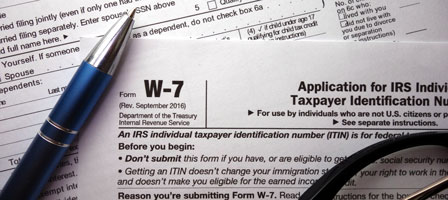Tax Pro Plus
2999 Overland Ave.
Suite 204
Los Angeles, CA 90064
Map It!
Ph: (310) 827-4829
Fax: (310) 842-7160
info@taxproplus-la.com
Is Your Individual Taxpayer Identification Number Expiring?
 Article Highlights:
Article Highlights: - Expiring ITINs
- Renewal Process
- IRS Notice
- Spouses or Dependents
- Family Renewal Option
- Filing With An Expired ITIN
- Passports
Under a recent tax law change, ITINs that have not been used on a federal tax return at least once in the last three consecutive years will expire Dec. 31, 2018. In addition, ITINs with middle digits 73, 74, 75, 76, 77, 81, or 82 will also expire at the end of the year (even if the ITIN has been used in the past three years). Thus, those people with expiring ITINs who expect to file a tax return in 2019 must renew before they can file their 2018 return.
Individuals with expiring ITINs are encouraged to renew soon to avoid delays that could affect their tax filing and refunds in 2019.
How to renew an ITIN - To renew an ITIN, a taxpayer must complete a Form W-7 and submit all required documentation. Taxpayers submitting a Form W-7 to renew their ITIN are not required to attach a federal tax return. However, taxpayers must still note a reason for needing an ITIN on the Form W-7. There are three ways to submit the W-7 application package. Taxpayers can:
- Mail the Form W-7, along with original identification documents or copies certified by the agency that issued them, to the IRS address listed on the Form W-7. The IRS will review the identification documents and return them within 60 days.
- Work with Certified Acceptance Agents (CAAs) authorized by the IRS to help taxpayers apply for an ITIN. CAAs can authenticate all identification documents for primary and secondary taxpayers, verify that an ITIN application is correct before submitting it to the IRS for processing, and authenticate the passports and birth certificates for dependents. This saves taxpayers from mailing original documents to the IRS.
- Instead of mailing original identification documents to the IRS, call and make an appointment at a designated IRS Taxpayer Assistance Center to have each applicant’s identity authenticated in person Applicants should bring a completed Form W-7 along with all required identification documents. See the TAC ITIN authentication page on the IRS web site for more details.
Spouses or Dependents - Spouses or dependents residing inside the United States should renew their ITINs. However, spouses and dependents residing outside the U.S. do not need to renew their ITINs unless they anticipate being claimed for a tax benefit (for example, after they move to the U.S.) or if they file their own tax return. This is because the deduction for personal exemptions is suspended for tax years 2018 through 2025 by recent tax reform. Consequently, spouses or dependents outside the U.S. who would have been claimed for this personal exemption benefit and no other benefit do not need to renew their ITINs this year.
Family Renewal Option - Taxpayers have the option to renew ITINs for their entire family at the same time. Those who have received a renewal letter from the IRS can choose to renew the family’s ITINs together, even if family members have an ITIN with middle digits that have not been identified for expiration. Family members include the tax filer, spouse, and any dependents claimed on the tax return.
What Happens If a Return Is Filed With An Expired ITIN? - Federal tax returns that are submitted in 2019 with an expired ITIN will be processed. However, certain tax credits and any exemptions will be disallowed. Taxpayers will receive a notice in the mail advising them of the change to their tax return and their need to renew their ITIN. Once the ITIN is renewed, applicable credits and exemptions will be restored and any refunds will be issued.
Passports - As a reminder, the IRS no longer accepts passports that do not have a date of entry into the U.S. as a stand-alone identification document for dependents from a country other than Canada or Mexico, or dependents of U.S. military personnel overseas. The dependent’s passport must have a date of entry stamp, otherwise the following additional documents to prove U.S. residency are required:
- U.S. medical records for dependents under age 6,
- U.S. school records for dependents under age 18, and
- U.S. school records (if a student), rental statements, bank statements, or utility bills listing the applicant’s name and U.S. address, if over age 18.
|
|  |